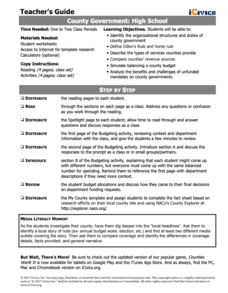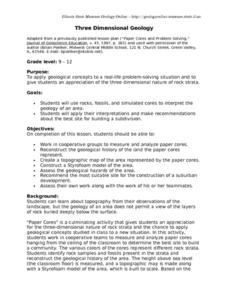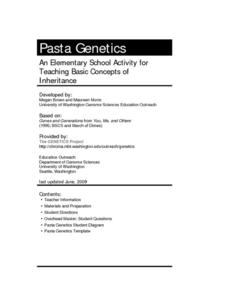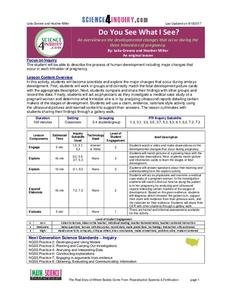Curated OER
Designing a Real Life Ecosystem!
Students research abiotic and biotic factors concerning the concept of an ecosystem. Record and analyze data collected. Write a lab report in proper and scientific format with thinking and analytical skills. Work as a cooperative team.
Scholastic
Study Jams! Light Absorption, Reflection, & Refraction
Zoe and RJ are trying to photograph an egret on a lake, but they are having trouble with the lighting. Reflection, refraction, and absorption are explored through their thoughtful dialogue so that your physical scientists are illuminated...
Curated OER
Summer Science Recipes: Experiments on the Grill and in the Kitchen
Generate ideas about the most scientifically sound ways to prepare foods safely and efficiently during the summer season. Learners will use the GED Connection Science Workbook, so they can practice the skills needed to prepare for the...
Cornell University
Fibers, Dyes, and the Environment
Nanofibers can be made through electrospinning or force spinning in order to reduce the negative impact on the environment. Pupils study the role of fibers and dye on the environment through a series of five hands-on activities. Then,...
NOAA
What Little Herc Saw
See the underwater world through a different pair of eyes! Middle school marine biologists identify deep-sea organisms by examining images taken by an ROV from the Okeanos Explorer. After determining what creatures lie beneath the...
Curated OER
The Class Trip
Mrs. Moore's class is trying to earn money for a trip to the science museum, but how much more do they need? Solve this problem with your own class as they develop their ability to model real-life situations algebraically. As an added...
Curated OER
The Probabilities of Problems: A Look at Genetic Inheritance
Discuss an article about families affected by genetic disorders and their decisions about whether or not to evaluate their own genetic information. Investigate four different inherited disorders. Participate in a probability exercise....
Columbus City Schools
Get Your Organisms Organized
From large to small, show your class how to organize them all! Included within the guide is everything you need to take their knowledge of classification from the cellular to the species level. The worksheets focus on building vocabulary...
Science 4 Inquiry
The Last Supper: Identifying Macromolecules
Why do medical examiners always state the contents of a person's stomach? Scholars learn about the importance of macromolecules through a case study of stomach contents. They perform multiple tests to determine a conclusion before they...
Curated OER
Changing Planet: Permafrost Gas Leak
Pair earth scientists up to use an amazing online arctic portal mapping tool and Google Earth to analyze permafrost changes. They compare changes to data on atmospheric concentrations of methane to see if there is a correlation. Then...
National Center for Case Study Teaching in Science
A Tale of Two Houses
Does it cost more per year to heat Bill's home in North Dakota or to cool Bubba's home in Georgia? Using heat transfer concepts, mathematical equations, and critical thinking skills, young engineers work in groups to determine who is...
iCivics
County Government: High School
Balancing a budget—the bane of many people's existence! Yet, its' something that must be done, especially in government systems. The resource, fourth in a seven-part series exploring local government, focuses on various exercises that...
Curated OER
Three Dimensional Geology
Here is a fine lesson plan on geology designed for high schoolers. Learners use rocks, fossils, and other geological clues to determine the geology of an area. Then, they make recommendations to a fictitious city council about the...
Northwest High School Science
Metric Conversion: Stair-Step Method
Elevate young scientists' skills with unit conversion using the stair-step method. Detailed instructions and a neat stair-step diagram are on the first page. Four pages of practice problems follow, mostly with real-world applications....
TED-Ed
Tycho Brahe, the Scandalous Astronomer
Who says scientists are boring geeks? Certainly not the narrator of a short video who dishes up the scandals associated with Tycho Brahe, a Danish scientist and alchemist (now that's two labels you don't often see together) who used...
SurfScore
Kodable
Prepare young scholars for life in the twenty-first century with this introduction to computer coding formatted as a fun problem solving game, this resource is a great way to develop children's sequential thinking skills.
California Academy of Science
Coral and Chemistry
Using cabbage juice as a pH indicator, future scientists explore the effect of increasing carbon dioxide on the pH of the ocean and relate it to the health of coral reefs. Ideal for an earth or environmental sciences course, this lesson...
National Wildlife Federation
Ghost Town
Around 93 percent of the reefs on Australia's Great Barrier Reef have been bleached, and almost one quarter of them are now dead. Scholars research the sea temperatures, especially around the areas with coral reefs, to make connections...
National Library of Medicine
Your Environment, Your Health: Food Safety
Did youknow that chicken causes the greatest risk of food-borne illness. The fourth unit in a six-part series addresses food safety. Scholars research common scenarios of food causing illness through the National Institute for Health....
US Environmental Protection Agency
Carbon Through the Seasons
Meteorologists view an animated video by the Environmental Protection Agency to learn how the carbon cycle works, and then move into groups to analyze and graph actual data of the atmospheric carbon dioxide concentration from Hawaii's...
University of Washington
Pasta Genetics
Four different-shaped and dyed pasta types represent four different alleles. Following a guide sheet, young geneticists practice randomly selecting alleles and discover the traits of the resulting offspring. This is a fun and solid...
Science 4 Inquiry
Do You See What I See?
In only nine months, a small group of cells grows into a fully developed baby. Pupils learn about the development of an embryo to a fetus to a baby. They identify each step of weekly development. Young scientists look at ultrasounds to...
Curated OER
Fractions - Equal or Not
A fabulous lesson on fractions awaits your young mathematicians. In it, learners are invited to explore the world of fractions by accessing websites that have educational activities and worksheets embedded in them. Some excellent,...
Curated OER
X-ray Spectroscopy and the Chemistry of Supernova Remnants
This link takes you to a comprehensive unit that delves into emission spectra and supernovas. There are four parts: How and where elements are created, electromagnetic radiation, spectroscopy, and the newest technology for studying our...

























